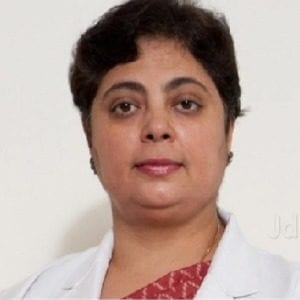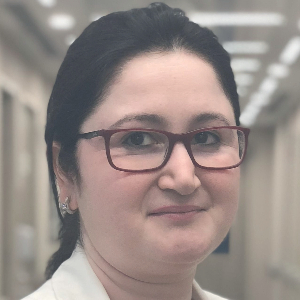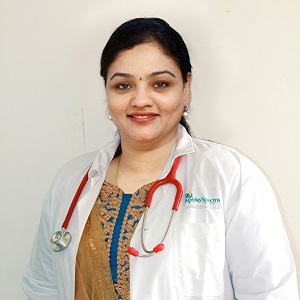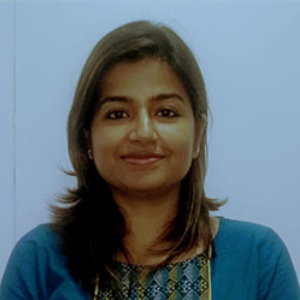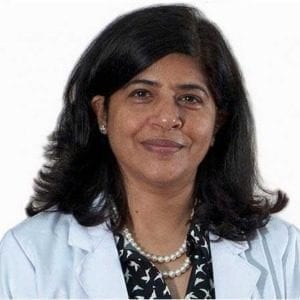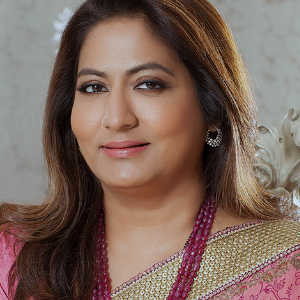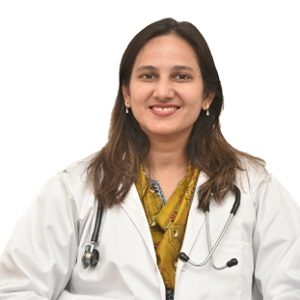Best Doctors in India for Pap Smear Test
- Sr Consultant Doctor in Obstetrics & Gynaecology, Gurugram, India
- Over 30 years’ experience
Profile Highlights:
- Dr. Manavita Mahajan has been a practicing obstetrician & gynecologist in Gurugram for the last 30 years.
- Known for being a strong proponent of safe motherhood practices, Dr. Mahajan has worked to implement these practices in her hospital practice as well. She has also been a speaker and faculty on gynecological laparoscopy at several national conferences because of her laparoscopic surgical skills.
- Dr. Mahajan is also a trainer and faculty in various educational programs.
- IVF Specialist & Gynaecologist, Gurugram, India
- Over 18 years' experience
Profile Highlights:
- Dr. Meenakshi Dua is a well-known gynecologist in India specializing in IVF and Infertility.
- She has an experience of 18+ years in the field of infertility treatment and has helped a large number of people with infertility issues.
- Dr. Meenakshi Dua is an expert in all kinds of Assisted Reproductive Technology and is highly trained in reproductive endocrinology, fetal Doppler, and advanced-level ultrasounds in gynecology and obstetrics.
- Obstetrician & Gynaecologist, Chennai, India
- Over 22 years’ experience
Profile Highlights:
- Dr. Meenakshi Sundaram is a gynecologist and obstetrician in Chennai and has over 22 years of experience in these fields.
- She completed her MBBS from the Medical University (TNMGRMU) and Completed her MD in Obstetrics and Gynecology (Obstetrics and Gynecology) Medical University (TNMGRMU).
- Some of the services provided by the doctor are: Uterine Fibroid Treatment, Uterine Artery Ligation
- IVF Specialist & Gynaecologist, Gurugram, India
- Over 20 years’ experience
Profile Highlights:
- Dr. Meenu Handa is a gynecologist and IVF specialist, who serves as the Unit Head of the Fortis Bloom IVF Centre at Fortis Memorial Research Institute in Gurugram.
- She specializes in multiple areas which include male infertility, recurrent IVF specialties, intracytoplasmic sperm injection, and endoscopic fertility surgeries.
- IVF Specialist & Gynaecologist, Kolkata, India
- Over 10 years’ experience
Profile Highlights:
- Dr. Moumita Naha is a consultant Gynecologist and Obstetrician in Kolkata.
- Dr. Naha is one of the best infertility experts in Kolkata and has assisted in achieving several successful pregnancies in women with various fertility issues.
- She is an expert in IVF, IUI, ICSI, management of infertile couples, recurrent IVF failure, recurrent miscarriage, endometriosis, reproductive endocrinology, sexual medicine, and Andrology.
- Obstetrician & Gynaecologist, Gurugram, India
- Over 26 years’ experience
Profile Highlights:
- Dr. Mukta Kapita has attained expertise in managing high-risk pregnancies, as well as laparoscopic and hysteroscopic surgeries. She also excels in urogynaecological procedures with more than 20 years of experience in this field.
- She has traveled all over the country, and the world, and has been exposed to some of the best equipment and hospitals in this field.
- IVF Specialist & Gynaecologist, Gurugram, India
- Over 30 years’ experience
Profile Highlights:
- Dr. Nandita Palshetkar is one of the best and leading IVF specialists in India with expertise in all kinds of infertility treatment.
- She along with Dr. Hrishikesh Pai is responsible for starting Assisted Laser Hatching in India in 1998 and also delivered the first laser hatching twins in the country.
- With training in IVF and Micromanipulation from the University of Ghent, Belgium, Dr. Nandita Palshetkar has helped more than 25,000 couples to start a family. She along with her team of experts performs more than 3000 ART cycles every year.
- Obstetrician & Gynaecologist, Gurugram, India
- Over 12 years’ experience
Profile Highlights:
- Dr. Neha Gupta is one of the best Gynecologists and infertility specialists in Delhi NCR, having more than a decade’s experience.
- In her 12 years of experience, she gained expertise in Hysteroscopic and Laparoscopic procedures.
- Urinary incontinence, ectopic pregnancy, Pelvic floor repair surgeries, uterine prolapse, uterine polyps, surgeries for fibroids, etc. are her core specialties.
- Obstetrician & Gynaecologist, Gurugram, India
- Over 17 years’ experience
Profile Highlights:
- Nidhi Rajotia is one of the best Gynecologists who has over 17 years of experience in obstetrics and Gynecology.
- She has a therapeutic focus on high-risk pregnancies, infertility treatment counseling, ovulation induction, follicular monitoring, hormonal treatment, IUI, and IVF in addition to open and laparoscopic gynecological surgeries.
- Obstetrician & Gynaecologist, Gurugram, India
- Over 35 years’ experience
Profile Highlights:
- Dr. Nutan Agarwal is an eminent Obstetrician & Gynecologist.
- Dr. Nutan Agarwal is credited with pioneering various PCOS medications in India, such as Metformin and myoinositol.
- She has also developed several treatments, such as ablation in multiple pregnancies, and formulated a guideline for managing irregular uterine bleeding in the Indian context.
Best Hospitals in India for Pap Smear Test
Pushpawati Singhania Hospital & Research Institute, New Delhi
- City: New Delhi, India
Hospital Highlights:
- Established in 1996, Pushpawati Singhania Research Institute is one of the top hospitals in the NCR region, as well as one of the top facilities in India for gastroenterology. The hospital is one of South Asia’s first institutes in medical and surgical treatment for diseases related to digestion.
- The hospital is equipped with state-of-the art facilities coupled with the latest equipment as well as renowned consultants from various parts of India as well as other parts of the world.
W Pratiksha Hospital, Gurgaon
- City: Gurugram, India
Hospital Highlights:
- W Pratiksha Hospital, Gurugram, is one of the best hospitals in the NCR region. It is also a top hospital in India for IVF. Since its inception, the hospital has performed over 5500 successful IVFs. The hospital also specializes in gynecology.
- With over 20 years of experience in providing quality healthcare, the hospital is known as one of the most trusted and valued health providers in India.
- Equipped with world-class medical facilities and advanced technology, the hospital’s doctors and clinicians also have a track record of delivering excellent results. The hospital is also known for focusing on preventive well-being as much as on curative treatment.
- The hospital has earned the trust of its patients, by providing the best available treatments at affordable costs.
Narayana Superspeciality Hospital, Gurugram
- City: Gurugram, India
Hospital Highlights:
- Situated near DLF Cyber City, Gurugram, Narayana Superspecialty Hospital is one of the top medical facilities in the Delhi NCR region, catering to the needs of the people. Known for its commitment to quality medical care and patient service, the hospital is a state-of-the-art facility with planned and well-equipped sections, which includes a spacious OPD area as well as comfortable patient rooms.
- It is the closest super-specialty hospital from Indira Gandhi International Airport towards Gurugram, and also the nearest super specialty hospital from DLF Cyber City. It is also close to major residential areas in Gurugram.
- It is part of the renowned Narayana Health Group. Established in 2000, by Dr. Devi Shetty, a renowned cardiac surgeon, it has grown to be one fo India’s leading healthcare groups.
Sir Ganga Ram Hospital, New Delhi
- City: New Delhi, India
Hospital Highlights:
- Sir Ganga Ram Hospital, New Delhi is known to provide the latest medical procedures with the latest technology in all of its units.
- The hospital has a team of reputed doctors, nurses, and healthcare professionals that ensure that patients receive quality care at affordable costs.
- Staffed with a team of highly qualified doctors, dedicated nurses, and paramedical and non-medical staff, the hospital aims to lead in healthcare delivery, medical education, training, and research.
- As per the vision of the founder, the hospital also provides free treatment to the economically weaker sections of society.
- Sir Ganga Ram Hospital also provides training to young doctors under the Diplomate in National Board(DNB) program. The DNB program at the hospital was started in 1984 and it is known for currently running the maximum number of DNB specialties in the country. It also has the distinction of having the first bone bank in India.
CK Birla Hospital, Gurugram
- City: Gurugram, India
Hospital Highlights:
- The CK Birla Hospital in Gurugram is a NABH-accredited multi-specialty hospital.
- The hospital strives to increase the quality of healthcare by focusing on UK NHS nurse and midwife training requirements. Policies and practices derived from the National Institute for Health and Treatment Excellence (NICE) recommendations in the United Kingdom ensuring that a strong focus on safety, high-quality clinical care, and sanitation is maintained.
- The hospital’s cutting-edge technology and facilities allow for real-time communication and seamless collaboration among caregivers, ensuring accuracy and the best possible results. Those with foreign experience and accreditations make up part of the hospital’s team of clinicians.
KIMS Hospital, Hyderabad
- City: Hyderabad, India
Hospital Highlights:
- KIMS Hospital (a brand name of Krishna Institute of Medical Sciences) is one of the largest and best multi-speciality hospitals in Hyderabad. The hospital provides various treatments to an enormous number of patients.
- The hospital has a capacity of more than 3000 beds. KIMS Hospitals offers different healthcare services in more than 25 specialities and super specialities.
- The hospital is equipped with modern medical equipment and technology. It has robotic equipment to provide minimal invasive techniques for patients.
- The hospital is aimed at providing world-class healthcare facilities and services at an affordable cost for patients.
- The various specialities and departments of the hospital include neurosciences, gastroenterology & hepatology, robotic science, reproductive sciences, dental science, oncological sciences, organ transplantation, heart and lung transplantation and mother and child care.
Fortis Hospital, Shalimar Bagh
- City: New Delhi, India
Hospital Highlights:
- Fortis Hospital in Shalimar Bagh is a multi-super specialty hospital that strives to provide world-class patient care by leaving no stone unturned.
- Fortis, Shalimar Bagh, with 262 beds and a 7.34-acre footprint, provides the best level of medical care through its team of doctors, nurses, technicians, and management professionals.
Reliance Hospital, Mumbai
- City: Mumbai, India
Hospital Highlights:
- Reliance Hospital is one of the best super-specialty care hospitals in Navi Mumbai.
- The main purpose of this hospital is to become a trustworthy place for the best health and hope for society. The hospital is well connected to the suburbs of Mumbai and Navi Mumbai.
- The hospital has various specialty departments, viz., Accident & Emergency, Anesthesiology, Dental Services, Dermatology, Diabetology, Dietetics Nutrition, Endocrinology, ENT, Gastroenterology, General Surgery, Gynaecology And Obstetrics, Hepato Pancreato Biliary Surgery, Infectious Disease, Internal Medicine, Interventional Radiology, Laboratory Medicine, Minimal Access Laparoscopic Surgery, Nephrology, Neurosciences, Opthalmology, Orthopaedics, Paediatrics, Pain Management Palliative Care, Physical Medicine Rehabilitation, Plastic And Reconstructive Surgery, Psychiatry, Pulmonary Medicine, Radiology, Rheumatology, Transplant, Urology Andrology, Vascular Surgery
Lilavati Hospital & Research Centre, Mumbai
- City: Mumbai, India
Hospital Highlights:
- Lilavati Hospital & Research Centre is India’s premier multi-speciality tertiary care hospital and has been recognised as a global medical excellence centre.
- Lilavati Hospital & Research Centre has built an unrivalled level of trust with its patients over the years, thanks to a solid foundation that comprises cutting-edge facilities, the best medical competence, research, education, and charity endeavours.
- The hospital is quite proud of the fact that it now serves patients from all kinds of backgrounds, not just from the United States but from all around the world.
- The hospital has a total of 323 beds, one of the largest Intensive Care Units (ICUs), 12 Operation Theatres with modern amenities, over 300 consultants, and almost 1,800 personnel.
Venkateshwar Hospital, Dwarka, New Delhi
- City: New Delhi, India
Hospital Highlights:
- State-of-the-art technology and devoted healthcare professionals have been brought together under one roof at Venkateshwar Hospital to provide genuine medical care. The hospital’s professionals work together as a team to deliver the best possible treatment to their patients, using the most sophisticated equipment and information technology.
- Venkateshwar Hospital’s mission is to attain global excellence in healthcare by employing evidence-based, ethical clinical practices and cutting-edge technology by a team of highly skilled experts.
Pap Smear
Pap smear also termed as Pap test, is a procedure for testing cervical cancer in women. It involves collecting cells from the cervix, which is the lower narrow end of the uterus, which lies at the top of the vagina.
Detecting the cancer early on, with a Pap smear, gives one a greater chance of curing it. This procedure can also detect changes in your cervical cells that may suggest cancer developing in the near future. A Pap smear can easily help you detect any abnormal cells, which is your first step in stopping the possible development of cervical cancer.
Purpose
The purpose of Pap smear is to screen for cervical cancer.
Regular Pap smears are recommended for women every three years from the age of 21. For women who are HIV-positive or those having a weakened immune system from chemotherapy or organ transplant, it is needed more frequently.
This procedure is usually done in conjunction with a pelvic exam. For women who are older than the age of 30, the Pap test can be combined with a test for human Papillomavirus (HPV) – a common sexually transmitted infection that can lead to cause cervical cancer. The HPV test may be done instead of a Pap smear in a few cases.
Women who are aged 30 and older may consider Pap testing every five years if the procedure is combined with HPV testing. Or they can also consider HPV testing instead of the Pap test.
Your doctor may recommend more frequent Pap smears, regardless of your age, if you have certain risk factors such as:
- A Pap smear that showed precancerous cells or a diagnosis of cervical cancer
- HIV infection
- Exposure to diethylstilbestrol (DES) before birth
- A history of smoking
- Weakened immune system due to chemotherapy, organ transplant or chronic corticosteroid use
You should discuss the benefits and risks of Pap smears with your doctor and decide what’s best for you based on your risk factors.
There are certain situations in which a woman and her doctor can end Pap testing such as:
After a total hysterectomy: After a total hysterectomy, surgical removal of the uterus including the cervix, you can ask your doctor if undergoing Pap smears is still required.
You will likely be able to discontinue Pap smears, if your hysterectomy was performed for a noncancerous condition, such as uterine fibroids.
However, if your hysterectomy was for a precancerous or cancerous condition of the cervix, it is likely that your doctor will recommend continuing routine Pap testing.
Older age: It is generally agreed by doctors that women can choose to consider stopping routine Pap testing at the age of 65 if their previous tests for cervical cancer have been negative.
You can discuss your options with your doctor and together you will be able to decide what’s best for you based on your risk factors. Your doctor might recommend you to continue with the tests if you are sexually active.
Preparation
You should follow these tips prior to your test for ensuring that your Pap smear is most effective:
- Avoid intercourse, douching as well as any vaginal medicines or spermicidal foams, creams or jellies for a minimum of two days before the Pap smear, as these may cause abnormal cells to be obscured or washed away.
- It is better if you don’t schedule your Pap smear during your menstrual period.
During the Procedure
A Pap smear can be performed in a doctor’s office and it takes just a few minutes. You might be asked to fully undress or only from the waist down. You will need to lie down on your back on an exam table with your knees bent.
First, your doctor will be gently inserting an instrument called a speculum into the vagina. This holds the walls of your vagina apart so that your doctor is easily able to see your cervix. You might experience a sensation of pressure in the pelvic area while the speculum is being inserted.
Then your doctor will need to take samples of your cervical cells with the use of a soft brush and a flat scraping device which is called a spatula. This usually does not hurt.
After the Procedure
After the procedure is complete, you can resume your normal activities without any restrictions.
Depending on the type of procedure you’re undergoing, your doctor will transfer the cell sample collected from your cervix into a container that holds a special liquid to preserve the sample. He/she might also use a glass slide.
Then the samples are transferred to a laboratory where they are examined under a microscope in order to look for characteristics in the cells which can indicate cancer or a precancerous condition.
After this, the samples are transferred to a laboratory. Here they are examined under a microscope to look for characteristics in the cell that can indicate cancer or a precancerous condition.
You can ask your doctor regarding how long you will need to wait before the results of your test are out.
Results
The results of your Pap smear can either be normal or abnormal.
Normal Pap smear- If the results are normal, this means that there were no abnormal cells identified. The normal result is also termed as negative. If your result is normal, you won’t be needing this test again for at least three years again.
Abnormal Pap smear- However, if the test results are abnormal, you need not worry, as this doesn’t necessarily mean that you have cancer. It just means that there are cells in your cervix which are abnormal and some of them may be precancerous.
Abnormal cells are of several levels:
- atypia
- mild
- moderate
- severe dysplasia
- carcinoma in situ
Milder abnormal cells are generally more common as compared to severe abnormalities.
Depending on your results, your doctor might recommend:
- increasing the frequency of your Pap smears
- getting a closer look at your cervical tissue using a procedure termed as Colposcopy
During a colposcopy exam, your doctor will take the help of light and use magnification to see the vaginal and cervical tissues more clearly. In some cases, they can also take a sample of your cervical tissue in a procedure termed as a biopsy.

